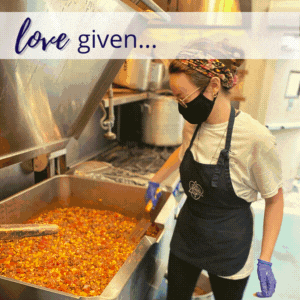
From earth to table, from farm community to intentional community, the St. Joseph Worker (SJW) Program considers ways that their volunteers can live and serve sustainably and holistically. SJW ministers in five cities around the country. Their Minnesota branch offers placement sites on farms and in agricultural settings. The volunteers participate in the growing and food-processing operations on the farm, as well as serve alongside and minister to the local people.
Andrea Pearson Tande, the Program Director at the St. Paul/Minneapolis office, describes the reasons behind the SJW choice of environmental placement sites:
“Our environmental and food justice placements this year are very intentional. We sought out placements that would allow us to stay as true as possible to the stated values of the Sisters of St Joseph of Carondelet. The last time the CSJs had a full congregational meeting, they very specifically spelled out care for the Earth to be one of the most important values that would drive their future work. Since these stated values serve as a touchstone for CSJs as they go out to do good work in the world, we believe that’s also true for us as SJWs.”
“As ties between our diet, land use, and larger social justice issues become more prominent in the world, we have lots of potential volunteers coming to us who say they are passionate about these issues.” Andrea said. “So it’s really a natural step.”
The farms that the volunteers work on are both rural and urban. The volunteers assist programs that nurture not only the land, but also the people that live on the farms and in the local communities. The volunteers are able to work alongside and be present with the local people. Youth Farm and Market Project teaches urban youth how to include healthy foods in their diets as well as grow their own food. The youth who participate in the program learn leadership skills as they market and sell their produce at special farmers markets and co-ops.
Dream of Wild Health is a rural farm that works with American Indian youth, most of whom live in urban areas, to teach them about caring for the Earth and how that is connected with their heritage. Much of the food grown by this program is sold at farmers markets in the Native communities, so that the organic food is benefiting the people who grew it.
At the Minnesota Food Association, the SJW volunteer assists with the growing, harvesting, and vegetable cleaning operations of the farm. Their mission is to help local farmers learn and practice organic and sustainable farming methods, with a special mission toward engaging recent immigrants.
The volunteers are also able to benefit from the fruits of their harvest. The SJW women share community dinners several nights a week. Both volunteer houses have six women living in community, so “cooking for a crowd is something they all learn early in the year and using fresh produce from the gardens is really fun for them,” Andrea says.
Cooking with seasonal vegetables can be a new experience for some volunteers. Bridgette Kelly, SJW Program Coordinator, says that they often cook with foods they haven’t used before and that “cooking with whole foods is often a more economical and nutritious way to eat.”
Naturally, some of the volunteer community conversations and learning revolves around sustainable living. In September, the volunteers took a weekend retreat focused on simplicity and living closer to the earth. They spent time processing and canning fresh produce and discussed new ways to live simply and sustainably.
“As we open those cans in January and February, we hope it brings us back to the smells of summer and our commitments to live close to the earth and close to the heart of what matters in our life!” Bridgette reflects.
The learning portion of the volunteer experience is important to Andrea.
“We really hope that part of the SJW experience for every woman in the program, no matter the placement, is an exercise in simple living. There is so much to learn about where our food comes from, where we bought it, how it was grown, the people that grew it, what happened to the earth where it grew, and what it’s doing to our bodies. All of these questions can touch on important social justice issues. By being connected to farms, SJWs also learn some important lessons in community, such as how to cook 20 pounds of beets, and which neighbors like beets when it comes to the leftovers! Living a sustainable lifestyle is kind of trendy these days, but it is truly one way we can keep the greater good in mind every time we fill up our plates and our stomachs. Having people serve close to the earth on farms brings home a lot of these issues for the women in our program,” Andrea said.
To learn more about the farms and programs where the SJW serve, visit:
Youth Farm and Market Project http://www.youthfarm.net/





 Thousands of faith-based service opportunities can be at your fingertips with the RESPONSE. Download the latest edition today!
Thousands of faith-based service opportunities can be at your fingertips with the RESPONSE. Download the latest edition today!
